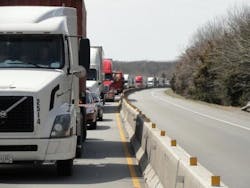If there is one overwhelming, undeniable, irrefutable reason to oppose surrendering federal control of the highway system to the states, it’s [insert the name of your state here]. Oh, and there’s the Constitution.
Devolution, for those fortunate enough not to have been slimed by this bad idea, is an arch-conservative notion that local officials would do a better job of planning, funding and building roads than distant federal masters in Washington.
The intuitive selling point is misleadingly simple: It’s the height of folly for states to collect tax money for roads and bridges then to send those tax dollars to Beltway bureaucrats only to have them take a cut and send back what’s left.
The position is spelled out in some detail by the Heritage Foundation, which argues that the federal highway system has been built, so Congress and the White House can officially butt out. Legislatively, that’s the aim of the reforms offered by the Transportation Empowerment Act.
Still, one might have thought the devolution bill was dead, after Sen. James Inhofe (R-OK), nobody’s liberal, admitted he was wrong 25 years ago when he had been one of the “fathers” of the plan. Simply, it won’t work, he’s concluded. And he said so in a recent Senate hearing on the next highway bill and again at the annual Washington Briefing hosted by state road building agencies.
“It was more fun to be for it than against it,” he quipped, but added the Constitution directs Congress otherwise. “The conservative position is to do an authorization bill. If you don’t, it’s going to cost 30% off the top—and that is not the conservative position. Interstate commerce doesn’t stop at state boundaries. No state is an island.”
But American Trucking Assns. (ATA), along with about 40 other business and labor groups, felt compelled to write Congress about the matter on Monday, so maybe the theory of devolution isn’t quite dead yet.
“Devolution represents abandonment by Congress of a most fundamental constitutional obligation to promote interstate commerce, and would prove disastrous to state and local governments’ ability to maintain, improve and coordinate their transportation systems when it is widely acknowledged that current resources are already seriously insufficient,” the letter reads. “This is particularly true for those states with lesser populations, more rural landscapes and an extensive highway network that supports a large share of interstate traffic.”
So allow me briefly to return to my thesis, which is that states have no business making policy that substantially impacts interstate commerce.
Since I live in Arkansas, let me count the ways. (I’m sure there’s a comparable list to be made for most states, although Alaska and Hawaii get a bye; California already goes its own way and Texas really, really wants to.)
A major East-West artery, I-40 across Arkansas has been a mess for years. The picture, at left, of the trucks backed up for miles is from exactly two years ago when I was on my way to the Mid-America Trucking Show. And truckers can still count on long delays between Little Rock and Memphis, although the construction zones move around a bit. But really, what could go wrong when global commerce is reduced to one narrow lane in each direction? Arkansas, for some locally decided but hard to explain reason, has more state highway miles than California, by the way. So it’s not that the Interstates don’t matter, it’s just there’s not much money. Think how bad I-40 would be without federal aid.
Weight-distance taxes: When the Federal Aid to Highway Act took effect in 1983, states were compelled to adopt the 80,000 truck weight limit. And that caused quite a stir in the statehouse. (My father, who worked for a trucking company, blamed the state’s most influential newspaper—which literally was owned by the railroads, he contended.) Rather than hang on to the previous 73,000-lb limit and surrender federal highway dollars, the legislature opted to tax trucks carrying more than that. Oh, and they exempted trucks hauling for critical Arkansas industries such as agriculture and timber. And that set off a border war—well, tax retaliation—and ultimately brought ATA lawyers to Little Rock who made a federal case out of it. All because of local politics.
Local politics: This is the part of the devolution movement I don’t understand. It’s truly a mystery why anyone would want to trust critical elements of the national infrastructure to the part-time circus that is the Arkansas legislature. No need to air the dirty laundry here, but if there’s a more insular, hypocritical and self-contradictory bunch of lawmakers, I’d be terrified.
On the other hand, I don’t know [your state here] quite so well, and I could be underestimating the incompetence of lawmakers there. But I doubt it.
Just say no to devo.
About the Author
Kevin Jones
Editor
Kevin has served as editor-in-chief of Trailer/Body Builders magazine since 2017—just the third editor in the magazine’s 60 years. He is also editorial director for Endeavor Business Media’s Commercial Vehicle group, which includes FleetOwner, Bulk Transporter, Refrigerated Transporter, American Trucker, and Fleet Maintenance magazines and websites.
Working from Beaufort, S.C., Kevin has covered trucking and manufacturing for nearly 20 years. His writing and commentary about the trucking industry and, previously, business and government, has been recognized with numerous state, regional, and national journalism awards.


